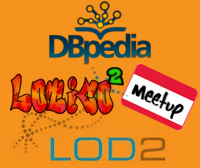
Keynote Speaker
Sofia Angeletou
is a Senior Data Architect for the BBC's Linked Data Platform, which builds the BBC's services for creating and publishing Linked Data. Prior to this, she was a Research Associate at the Open University investigating the user behaviour in online communities. Sofia obtained her PhD from the Knowledge Media Institute of the Open University and her doctoral research focused on enriching user generated content with publicly available ontologies.
Opening-Keynote September 5, 2014
Linked Data at the BBC: Connecting Content around the Things that matter to our Audiences
More than four years ago the first BBC website was released using a semantic publishing stack. Since then, major sporting events such as the World Cup 2010, the London Olympics 2012 and the Winter
Olympics 2014 were covered using Semantic Web Technologies. The success of these efforts demonstrated how linked data can improve and simplify production workflows and provide interesting automated
aggregations for our audiences. The vision of semantic publishing in the BBC has shifted from supporting high profile events to connecting the BBC's content around things that matter to the audience.
To this end, we have increased the application of linked data to domains other than sport such as news, education and music with the intention that the content we produce can be reused and discovered
through a multitude of channels. In this talk I will outline the technological and cultural factors that have influenced the BBC's adoption of linked data. I will describe some of the principles on
which we continue to expand linked data within the organisation, the early assumptions we made, their effects on the development of the platform and they way we are addressing them now. I will also
provide some insights into end-to-end workflows of content annotation and publishing, iterative and corrective approaches to data quality and the role of well-trained content editors.
Links:
Thomas Kelly
is a Director in Cognizant's Enterprise Information Management (EIM) Practice and heads its Semantic Technology Center of Excellence, a technology specialty of Cognizant Business Consulting (CBC). He has 20-plus years of technology consulting experience in leading data warehousing, business intelligence and big data projects, focused primarily on the life sciences and healthcare industries.
Keynote September 4, 2014
Enterprise Semantic Technology
Industrializing Your Organization's Semantic Technology Platform
Semantic technology is transforming how businesses are planning and building new information management capabilities. Organizations are using semantic technology to successfully deliver projects that combine public and private data with expert knowledge to deliver a new generation of applications with "smart" features. Enterprises that are seeking to repeat these successes on a larger scale are industrializing their semantic technology platform and practices.
Attend this session to help you start (or enhance) your enterprise semantic technology initiatives. You will learn how to:
- Create the semantic strategy and roadmap
- Establish a semantic technology competency center
- Align project and data governance objectives to speed project delivery while maximizing data value
- Accelerate ontology development for projects
- Define reference architecture models to guide project teams
- Extend existing investments in relational technology while delivering smart applications
- Open access to data while securing those data assets from unauthorized users
Phil Archer
joined the W3C staff in February 2009 after many years representing one of its member organisations. Chair of the POWDER Working Group, whose standards form part of the Semantic Web technology suite, he was also an original member of the Mobile Web Best Practices Working Group. In 2010 he switched focus to eGovernment and open data, in particular on improving interoperability between data sets. In December 2013 he became Data Activity Lead, coordinating W3C's work in the Semantic Web and related technologies.
Opening-Keynote Sept. 4, 2014
10 Years of Achievement
A suite of specifications reached W3C Recommendation status in February this year. As well as updating the 2004 specifications they included – at last – formal standards for Turtle, N-triples, N-Quads and TriG. Work on JSON-LD had been completed a month earlier. None of this would have happened without groups of experts dedicating substantial amounts of time to achieve it. What they brought to the table was huge experience of working with Semantic technologies including many notable successes.
It's sometimes said that the Semantic Web has failed. Let's put that nonsense to bed and look at 10 years of success and achievement, recognising where things could have been done better, and look at how the core ideas of URIs as identifiers and describing the world in graphs are finding relevance in large scale and critical systems.
Links
Orri Erling
is program manager for the Virtuoso Hybrid (SQL Tables & RDF Relational Property Graphs) RDBMS, at OpenLink Software. His extensive experience includes database engine design, query optimization, transaction processing, and scalability. As is known to most in the Linked Open Data (LOD) & Semantic Web communities, Virtuoso is core technology that underlies DBpedia, Linked Open Data cache, and a majority of data spaces that constitute the Linked Open data cloud.
Keynote September 4, 2014
Virtuoso, The Prometheus of RDF
The promises of semantic technology, from schema flexibility to unambiguous identifiers, have been overshadowed by considerations of performance and scalability for their whole history. This talk outlines how Virtuoso brings the fire from Mount Database to vitalize the RDF movement. The first part of this is excelling in leading edge database, including being even with or ahead of the leading relational analytics engines in their own domain. The second part of this is adapting the technology to accommodate the special cases that give RDF its flexibility. What is a certainty in in a relational schema is a high probability in RDF. Quite often, RDF serves as a means of integration between relational or other data sources with a schema. If data is big, it is also regular. Thus, the scalability question is about how to exploit the best in schema-first high end databases without locking one into a silo with a schema.
In the second part of the talk, we explore use cases in bio-informatics, publishing and business intelligence to demonstrate how RDF brings fast time to solution without compromise in performance.
Links to projects & presentations:






